Equity & Diversity Annual Report – 2002 1. Review of Policies & Practices
This section provides a summary of the outcomes over the past year in relation to diversity policies and practices; specifically, recruitment and selection, training and development, and conditions of employment.
1.1 Recruitment & Selection
General Recruitment
The Bank continues to attract talented staff, particularly via the annual graduate, cadetship and traineeship recruitment programs. This year, on-line recruitment has featured more prominently as a medium to attract employees, with an increase in usage of internet job boards in conjunction with more traditional media such as press and recruitment agencies. Traditional methods will continue to be used to ensure that the largest possible pool of potential applicants is tapped.
Graduates and Cadets
In 2001/02, the Bank conducted a comprehensive graduate and cadetship recruitment campaign to ensure that it was well placed to source key talent. On-line recruitment featured strongly both in marketing the benefits of employment with the Bank and to assist in streamlining application processing. Advertising material was also distributed more broadly. Paper-based recruitment packs were mailed to universities Australia-wide for circulation to Honours students, and representatives from the Bank's regional offices visited universities to discuss employment opportunities. Functions such as careers fairs and the Economic Society's annual Graduate Careers evening were used as vehicles to promote graduate and cadetship recruitment. This year, the Bank again hosted the Economic Society function, which saw over 100 students attend from various universities. The guest speaker, a former RBA economist, provided a female perspective on a career in economics.

The Bank recruited 39 graduates across the Bank via the 2002 intake of which 14 were women, double the number of the previous year. The majority of these graduates commenced under the new two-year Graduate Development Program. The figures also include the graduate intake from the recruitment program for the Bank's Systems and Technology department. The Cadetship Program saw 17 cadets offered graduate positions (effective at the completion of their Honours year); this included 3 women. This year offers to Cadets for graduate positions in 2003 were made following the work experience component of their cadetship, rather than the end of their Honours studies as in the past. This timing is aimed at securing higher numbers of cadets for graduate roles at the Bank.
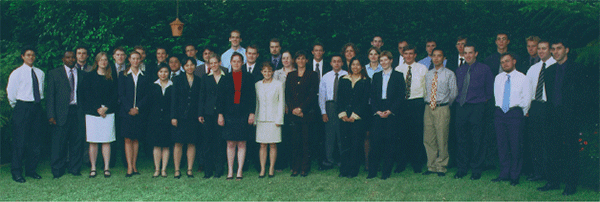
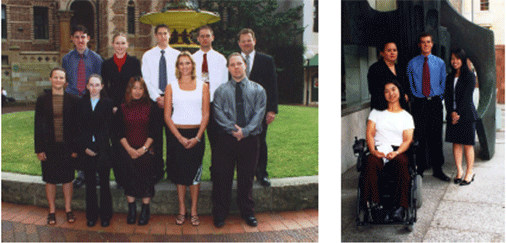
Traineeships
The Bank continues to support the New Apprenticeship Scheme, formerly the Commonwealth Government's Traineeship Program. The 2002 Traineeship recruitment drive saw nine departments offer 12-month traineeships in business administration, print design and information technology. The trainees taking part in the program included five women, four men, one Indigenous trainee and one trainee with a disability. The program remains a worthwhile means of offering training and broader employment opportunities to school leavers, Indigenous Australians and the long-term unemployed. It also provides a source of recruitment, with five trainees from the 2001 intake being offered continuing employment.
Recruitment Initiatives
Re-employment of female staff
The Bank has re-employed a number of former employees who had earlier resigned during, or after, parental leave. In this way, the Bank has been able to draw from a pool of talented, experienced women to fill positions across the Bank, some working in job-share arrangements. This initiative benefits both the Bank and the employees by enabling them to use their skills and knowledge at a time that best fits with their family obligations.
Redeployment of staff
The closure of Cash Services operations in Sydney in 2001 resulted in the displacement of several long-serving staff, both male and female. Some of these staff are from the non-English speaking background (NESB) designated group and had worked only in Cash Services during their Bank employment. After consultation with supervisors and displaced staff, six were redeployed into positions elsewhere in the Bank. This required retraining for some, and for others provided an opportunity to use skills and experience gained from past employment.
1.2 Staff Training & Development
A broad range of training programs has continued to be offered to staff during the year. However, in 2001/02 the training hours rose significantly due to the introduction of the Graduate Development Program and staff attending the Bank's 2002 Management Program.
Graduate Development Program
A series of training courses was scheduled for the two-year Graduate Development Program, implemented in February 2002. The courses are designed to assist new graduates establish themselves by developing business skills including PC applications, business writing, professional presentations, staff supervision, and career management. While these courses are available to staff more broadly, the Graduate Development Program sets out a formal training schedule over the two-year period.
Management Program
Twenty-one managers attended the Bank's Management Program which is held biennially. It was offered in two 5-day modules during March and May 2002. The program involves the Bank's senior management who present on the program. Over the three-month period, the program involves significant course and project work that is presented to members of senior management on the final day. Program participants considered staff management issues including diversity, performance management and feedback, motivation and talent management.

Orientation On-Line
A new on-line orientation program was made available to all new employees from February 2002. It brings together a range of information to acquaint new staff with the Bank's policies and work practices. Links are provided to the Personnel Department intranet site where the full policy documentation is located. The program has inbuilt tests that assess whether the recruit has absorbed the key elements. All new staff view the Bank's email, harassment, security and internet policy videos and their supervisors are provided with a list of discussion points that must be signed off for verification.
This program has been added to the large range of ‘e-learning’ options already available to staff, which provide greater flexibility in training delivery. Staff continue to use the on-line PC skills training which includes beginner to advanced level Microsoft Office applications, while specialist IT staff make use of the range of Microsoft accredited training courses.
General Training
Training has been offered to support the Bank's personnel policies covering selection panels, Grievance Contact Officers and performance appraisal. Staff are also trained in the use of the Bank's document management system. All the Bank's residential courses are available on a non-residential basis, to accommodate those with dependant care or other responsibilities.
The Bank regularly sends participants to a range of external courses in Australia and overseas. These include development and technical courses offered by the Bank of England, the Federal Reserve Bank of New York and SEANZA. Springboard, a professional development program for non-managerial women, has also continued to receive strong support from the Bank with seven women attending in 2001/02.
Training Expenditure Review
A review of training programs and expenditure for the period 1996 to 2001 was completed during the year. The review highlighted a shift in the proportion of in-house training dollars spent from the support and business areas to policy groups. This reflects both the closure of branches and reduction in the numbers of support staff in Sydney, as well as expanded graduate recruitment under the Graduate Development Program.
Educational Qualifications & Study Assistance
This is the third year that the Bank has reviewed data on the qualifications of its staff. Staff are asked annually (in March) to update and confirm the record of their personal details, including qualifications. Over the review period, there has been a marked increase in the percentage of staff with a post-secondary qualification – from 39% in 2000 to 64% in 2002. This is well above the community average. The increases are likely to reflect the larger numbers of graduates now being recruited into the Bank and earlier significant restructuring of non-core function areas.
PGSA & Study Assistance Committee 2001



Qualifications
The data show that of the 64% of staff who hold a post-secondary or tertiary qualification, 53% hold bachelor degrees and 23% have post graduate qualifications. As the graph shows, there is still a substantial gap between the genders. 54% of women in the Bank hold a post-secondary qualification, compared to 71% of men. This partly reflects the gender ratio of graduate recruits and the representation of women in clerical occupations in the Bank.
Further analysis looked at qualifications based on functional areas. As expected, staff in the policy areas – Economic, Financial Markets and Financial System – were highly qualified as this is where the majority of graduates have traditionally been placed. Business Services Group had the lowest representation with 45% of staff with a post-secondary qualification. This may be an indication of the nature of work in that area which has a strong on-the-job training focus.
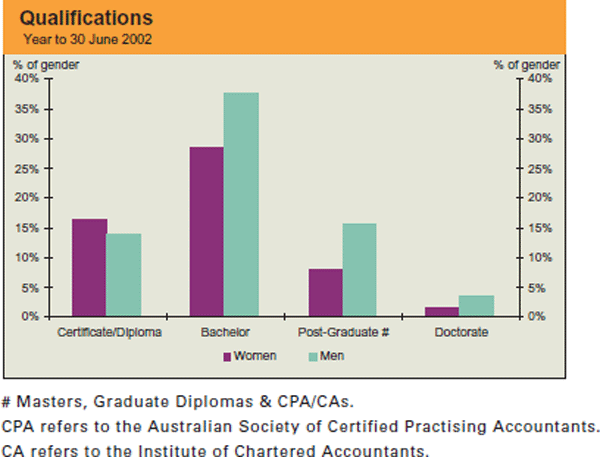
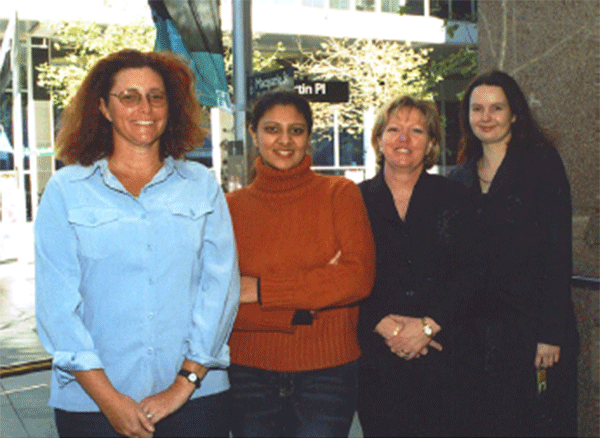
Study Assistance
The number of staff receiving study assistance continues to decline. This year 59 (7%) staff received assistance, compared to 73 (9%) last year. Last year's data showed that the percentage of women and men who received study assistance was the same (9%). However, the trend over the past three reporting periods shows that the representation of women has halved from 12% in 1999/00 to 6% in 2001/02.
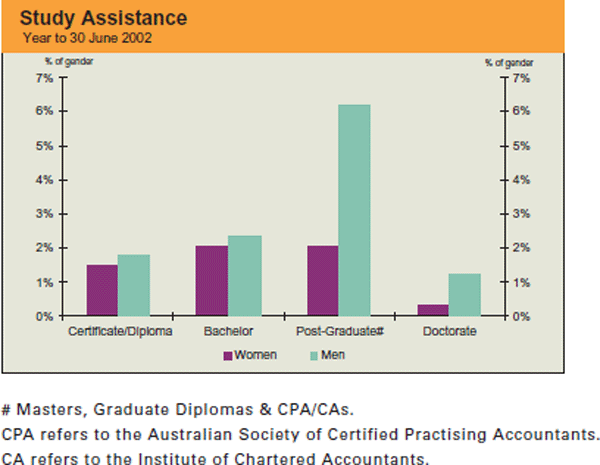
Over the same period the percentage of men receiving study assistance has also shown a decline from 11% to 7%. Men are still the highest users of post graduate study assistance, in most cases via the Bank's Post Graduate Study Award (PGSA) program. During the year, 7 people (2 women) were studying via the PGSA program, and a further two staff members were granted leave without pay to pursue studies at their own cost.




1.3 Conditions of Employment
Flexible Work Arrangements
An objective of the Bank's Diversity Plan is to ensure that personnel practices and policies are fair and equitable and assist in the retention of valued staff. Within the context of this objective, the Bank and workplace unions have agreed under enterprise bargaining arrangements to review the Bank's current flexible work options. The aim is to streamline the current provisions and develop, by the end of 2002, a single set of arrangements that recognises both employee and Bank needs.
Working from Home
Under the same enterprise bargaining arrangements, the Bank and unions have agreed to review practices by comparable employers relating to work performed on an occasional basis from home or elsewhere outside the workplace. If it appears that the needs of particular employees and the Bank could be satisfied by such arrangements, it is intended that a trial be implemented. This review is scheduled for completion by the end of 2002.
Salary Sacrifice for Superannuation
Salary sacrifice arrangements for superannuation were introduced from July 2001. The new arrangements and related changes provide employees with greater choice in making tax effective superannuation contributions to the Officers' Superannuation Fund.
Child Care Arrangements
During the year the Bank concluded a lengthy investigation of the possibility of introducing, through a joint venture, a Bank-provided child care facility for staff under salary sacrifice arrangements. The outcome was that such an arrangement would not be cost-effective for the Bank under current taxation requirements, and staff would not be able to salary sacrifice. However, the Bank has decided to continue to keep the matter under review and explore possibilities as they arise.
Long Service Leave Accrual
Changes to the long service leave accrual rates for employees who had not attained 10 years' service were implemented from July 2001. One of the aims of the change is to ensure the accurate determination of long service leave entitlements for employees who work for a period on a part time basis.
Consultation with Employees
The Bank continues to consult with employees through a number of forums on diversity issues and initiatives. One of the key aims of the new Diversity Plan is to raise awareness amongst staff generally on diversity issues and flexible work practices.
Information on equity and diversity continues to be distributed via the Bank's staff information sheet, Staff Matters, the in-house magazine, Currency, and the Bank's intranet. The Diversity Contact Managers' Network, with 14 members selected from senior management positions, provides invaluable information at a departmental level on workplace issues.
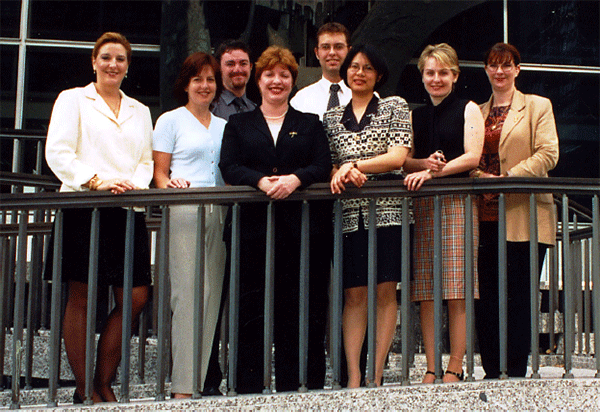
The Bank's 22 Grievance Contact Officers, nominated by their departments and trained annually, provide advice to staff to ensure that any workplace discrimination and harassment issues are dealt with effectively and efficiently. No grievances were lodged with the Grievance Authority during 2001/02.
Bank management and staff representatives jointly participated in various committees that consider issues relevant to equity and diversity.
Consultation with Workplace Unions
During the year the Bank consulted regularly with the main workplace union, primarily on issues relating to the introduction of flexible remuneration for some groups of staff. Consultation with workplace unions also took place on a range of award, health and safety and other general employment matters.